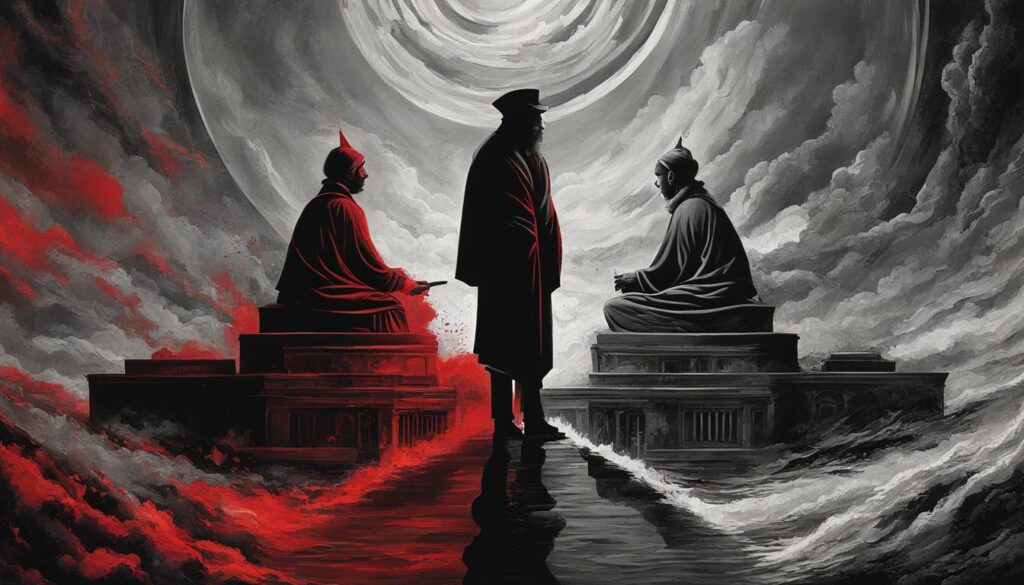Religion and reason have been at odds for centuries. Sam Harris’ audiobook, “The End of Faith,” explores this ongoing clash and how it impacts our world today. The audiobook also delves into the relationship between religion and terrorism, providing a critical analysis of their interconnectedness.
In this audiobook review, we will explore the main themes of “The End of Faith” and provide a thorough critique of its content. We will evaluate the audiobook experience, its impact on the audience, and compare it to other related works in the genre.
Key Takeaways
- “The End of Faith” explores the ongoing clash between religion and reason.
- The audiobook provides a critical analysis of the relationship between religion and terrorism.
- Our review covers the main themes, critique, narration and audiobook experience, audience reception and impact, and comparison to related works.
- “The End of Faith” continues to be a popular and influential work among its audience.
- Harris’ writing style is thought-provoking and challenges readers to consider their beliefs and the impact of religion on society.
About the Author: Sam Harris
Sam Harris is an American neuroscientist, philosopher, and author born in 1967. He earned a degree in philosophy at Stanford University and a Ph.D. in neuroscience at the University of California, Los Angeles. Harris is best known for his works advocating secularism and criticizing religion. His previous works include The Moral Landscape, Letter to a Christian Nation, and Waking Up: A Guide to Spirituality Without Religion.
Harris is also the founder of Project Reason, a non-profit organization promoting science and secularism. Furthermore, he has given numerous talks and lectures, including a TED talk titled “Science can answer moral questions” that has over 9 million views on YouTube.
The Relevance of Sam Harris in “The End of Faith”
Notably, Harris’s background in neuroscience and philosophy allows him to provide a unique perspective on the issues discussed in “The End of Faith.” His knowledge and expertise encourage critical thinking and analysis of the various themes of the audiobook. Understanding Harris’s background provides valuable insight into the philosophical and scientific foundations of his arguments in the audiobook.
Overview of “The End of Faith”

In “The End of Faith”, Sam Harris explores the dangerous intersection of religion and politics. Through a powerful blend of intellectual discourse and empirical analysis, Harris argues that faith-based belief systems are fundamentally flawed and pose a threat to society. The audiobook delves into the impact of religious violence and how it has been frequently rationalized by faith. By the end of the book, Harris argues that the only way to counter this threat is through reason and a commitment to empirical evidence.
Harris takes a bold and unapologetic stance toward religion, often challenging widely accepted beliefs and traditions. However, his arguments are always backed by rational thought, empirical evidence, and philosophical expertise. The audiobook provokes thoughtful consideration of the role of religion in society and the importance of reason and empirical evidence in shaping our beliefs and values.
Themes Explored in “The End of Faith”
Sam Harris’s “The End of Faith” primarily explores the challenging relationship between religion and reason. Harris argues that most religious beliefs are not only unfounded but dangerous and incompatible with reason and empirical evidence. Throughout the audiobook, he explores how religion has been used to justify acts of violence and terrorism throughout history, pointing out that religious fundamentalism can lead to extremism and fanaticism.
In addition to examining the relationship between religion and terrorism, Harris also delves into the ways in which religion impacts issues such as politics, ethics, and human rights. He argues that religious beliefs can often lead to intolerance, discrimination, and inequality.
The clash between religion and reason is a recurring theme throughout the audiobook, as Harris contends that many religious beliefs are fundamentally incompatible with scientific fact and rational thought. His argument is grounded in a thorough exploration of the religious texts and traditions that form the foundation of many faiths, as well as an analysis of the ways in which religious beliefs impact society and individual behavior.
Overall, “The End of Faith” is a thought-provoking exploration of the relationship between religion, reason, and violence. Through his analysis, Harris challenges readers to question their beliefs and examine the impact of religion on society as a whole.
The Clash Between Religion and Reason
The clash between religion and reason is a central theme throughout “The End of Faith.” Harris argues that religious beliefs are often based on faith rather than evidence, which makes them fundamentally incompatible with reason and scientific fact. This conflict between religion and reason has been a source of tension throughout history, leading to acts of violence and extremism that pose a threat to society as a whole.
Harris contends that it is essential to examine the relationship between religion and reason in order to understand the impact of faith on society and individual behavior. By exploring the roots of religious beliefs and traditions, he argues that it is possible to gain a more comprehensive understanding of the ways in which these beliefs impact the world.
The Relationship Between Religion and Terrorism
Harris argues that religion can be a driving force behind acts of violence and terrorism. He points to the role of religious fundamentalism in motivating terrorist groups, such as Al Qaeda and ISIS, who use religious beliefs to justify acts of violence and aggression.
Through a detailed analysis of religious texts and traditions, Harris highlights the ways in which religious beliefs can be distorted and misinterpreted to justify violent acts. He argues that it is important to examine the relationship between religion and terrorism in order to understand the roots of extremism and fanaticism.
Religion and its Impact on Issues such as Politics, Ethics, and Human Rights
Harris also explores the impact of religion on issues such as politics, ethics, and human rights. He argues that religious beliefs can often lead to intolerance, discrimination, and inequality, and that it is essential to examine the ways in which religious beliefs impact public policy and social attitudes.
Through his analysis, Harris challenges readers to question their beliefs and to consider the impact of religious beliefs on society and individual behavior. He argues that it is possible to find common ground between religion and reason, but that this requires a willingness to engage in critical thinking and a reexamination of traditional beliefs and values.
Critique of “The End of Faith”

After exploring the main themes and arguments presented in Sam Harris’s audiobook, “The End of Faith,” it’s time to provide a balanced critique. While the book highlights some important issues, it is not without its flaws.
One of the strengths of “The End of Faith” is Harris’s ability to challenge the reader’s assumptions and beliefs. He presents a compelling case against blind faith and irrational beliefs, and his arguments are logically sound.
However, the book can also be criticized for being too focused on attacking religion without acknowledging the benefits it provides to many people. It can come across as narrow-minded and dismissive of other worldviews.
The Strengths of “The End of Faith”
| Strengths | Explanation |
|---|---|
| Logical arguments | Sam Harris presents well-reasoned and logically sound arguments that challenge the reader’s beliefs. |
| Compelling case | Harris makes a compelling argument against blind faith and irrational beliefs, urging the reader to think critically about their worldview. |
The Weaknesses of “The End of Faith”
| Weaknesses | Explanation |
|---|---|
| Narrow-minded | The book is too dismissive of other worldviews, potentially alienating readers who don’t share Harris’s beliefs. |
| Too focused on attacking religion | “The End of Faith” can be criticized for being too focused on attacking religion without acknowledging the benefits it provides to many people. |
Despite its flaws, “The End of Faith” remains an important and thought-provoking audiobook. Listeners should approach it with an open mind and a willingness to engage with its ideas.
Narration and Audiobook Experience
Listening to an audiobook can provide a unique and immersive experience, with narration serving as a crucial factor in the overall enjoyment of the book. In the case of “The End of Faith,” the narration by Brian Emerson is clear, concise, and engaging, enhancing the work’s themes and arguments. Emerson’s pleasant and steady tone captures the essence of Sam Harris’s writing and maintains the listener’s interest throughout the audiobook.
The production quality of the audiobook also stands out, with excellent sound quality and crisp editing that enhances the listening experience.
Overall, the narration and audiobook experience of “The End of Faith” deliver a highly immersive and engaging listening experience that does justice to Sam Harris’s thought-provoking work.
Audience Reception and Impact
Upon its release, “The End of Faith” sparked significant discussions and reactions among its audience, particularly within the secular and religious communities. As an outspoken critic of religion, Sam Harris’s audiobook garnered both praise and criticism for its provocative and unapologetic approach to examining the role of religion in society.
Many listeners praised the audiobook for its bold and uncompromising examination of the dangers of religious extremism and the need for reason and evidence-based thinking. The audiobook resonated with those looking for answers and a way to reconcile religious beliefs with their rationality and scientific understanding.
However, others criticized Harris’s strong opposition to religion and saw it as unfair or unbalanced. Some religious groups criticized the audiobook’s claims and views, arguing that it unfairly portrayed their beliefs and ignored the positive aspects of religion.
Despite this, “The End of Faith” became a bestseller and has had a lasting impact on discussions around religion, reason, and extremism. Its influence can be seen in the ongoing debates around the role of religion in society and politics.
Key Takeaways:
- “The End of Faith” sparked significant discussions and reactions among audiences
- The audiobook garnered both praise and criticism for its examination of religion
- “The End of Faith” became a bestseller and had a lasting impact on discussions around religion and extremism
Comparison to Other Related Works
Sam Harris’s “The End of Faith” is an audiobook that explores the relationship between religion, terrorism, and reason, which makes it a unique piece in the genre. However, there are other works that also delve into similar themes.
One notable audiobook that could be compared to “The End of Faith” is Richard Dawkins’s “The God Delusion.” Like Harris’s work, Dawkins’s audiobook examines the role of religion in modern society and tries to demonstrate the irrationality of religious beliefs. However, while Harris focuses more on the aspects of religion related to terrorism, Dawkins covers a wider range of aspects such as the existence of God and the ethics of religion.
Another related work is Christopher Hitchens’s “God Is Not Great: How Religion Poisons Everything.” This audiobook is a critique of religion as a whole and examines the history and negative impact of religious belief. Hitchens’s work has a more journalistic approach and relies heavily on personal experience and historical evidence to make its point.
The table below summarizes the key similarities and differences between “The End of Faith” and the two related works:
As shown in the table, while there are similarities between the audiobooks, each work has its unique approach and focus. “The End of Faith” stands out for its analysis of the connection between religion and terrorism, “The God Delusion” for its examination of the existence of God, and “God Is Not Great” for its historical overview of religion’s negative influence. Therefore, compared to the related works, “The End of Faith” offers a more focused and specific approach to religious belief’s negative impacts.
Conclusion
In conclusion, “The End of Faith” by Sam Harris is a thought-provoking and compelling audiobook that explores the complexities of religion, reason, and terrorism. Harris presents insightful arguments and challenges listeners to rethink their perspectives on these issues. Overall, the audiobook offers a valuable contribution to the ongoing discourse surrounding these topics, and is well worth the listen.
While the book may not resonate with everyone, it has undoubtedly made an impact on its audience. “The End of Faith” has received widespread acclaim and sparked significant discussion in the community.
Comparing it to other related works, Harris’s audiobook stands out for its unique approach and well-researched arguments. The audiobook’s production quality and narration are also noteworthy aspects that contribute to an enjoyable listening experience for its audience.
In summary, “The End of Faith” is a must-listen for anyone interested in exploring the relationship between religion, reason, and terrorism. It challenges conventional wisdom and encourages critical thinking – something that is increasingly important in today’s complex world.



